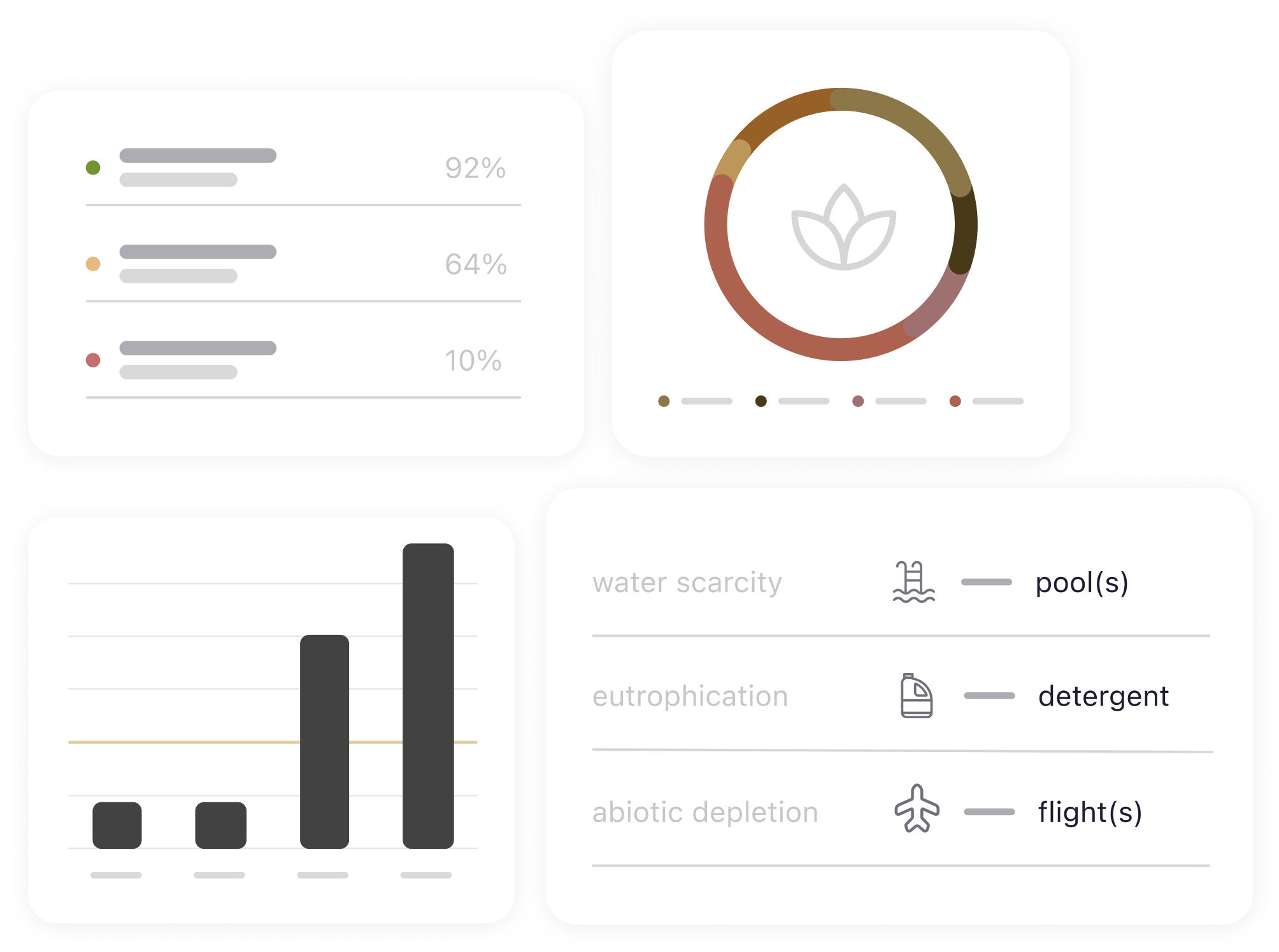When we talk about sustainability, it’s obvious that data plays a crucial role. The European Union has made it clear that, to avoid greenwashing, transparency must be data-driven to support sustainability claims. However, it’s worth asking what data is relevant to demonstrate genuine sustainable development. Are fashion brands taking concrete actions beyond showcasing their environmental commitment? In today’s article, we explain why data-driven integrative sustainability is more relevant than ever in the fashion industry.
The only way to report progress is through measurement, to understand where we stand and how we are progressing towards our goals
Transparency begins with data: what cannot be measured, does not exist. The only way to report progress is through measurement, to understand where we stand and how we are progressing towards our established goals. Although fashion and impact assessment are increasingly linked, thanks to legislative demands and a more aware public, many brands ignore the need to go beyond measuring only environmental impact.
When we talk about integrative, comprehensive or holistic sustainability, we are emphasizing the need to understand it in all its aspects: environmental, social, and economic, and above all, as a process of transformation towards a new development model that promotes the durability of a system encompassing both human and natural elements, which interact constantly.
If we read the sustainability reports of the most popular fashion brands in the market, we will continuously find terms such as “water consumption” or “carbon footprint measurement”. These companies focus on assessing their environmental impact, which is crucial, but they don’t provide a comprehensive view of their impact.
At BCome, we advocate for an integrative vision of sustainability that goes beyond the environmental dimension. We also consider the social, circular, and economic aspects of products. We believe in the interdependence of all these areas within a system and understand that neglecting one of them negatively affects the others, thereby hindering the achievement of true sustainability.
What essential data is required to adopt an integrative approach to sustainability?
Neglecting one aspect of your business while focusing on another is detrimental in the long run. Sustainability should be a philosophy deeply ingrained in the company, integrated across its DNA, and reflected in every operational aspect. Otherwise, you’ll only be applying temporary solutions that will eventually affect other areas of your business. These are the reasons why integrative sustainability is crucial to ensure the authentic progress of your fashion company:
Traceability is the beginning of everything. Starting by disclosing the country of origin of all raw materials used in the final product, as well as the location of the different processes it has undergone, facilitates the collection of crucial information about the product’s life cycle and, therefore, enhances the calculation of its impact.
Through its own PLM system, BCome provides key metrics to shed light on the supply chain of your fashion business. Here are some of the data points you’ll have at your disposal:
- Traceability score for each product.
- Comprehensive information on the materials used.
- Volume of suppliers involved at each stage of the chain.
- Associated certificates and best practices.
The environmental impact of fashion must be quantified. For a fashion company, measuring environmental impact should transcend simple carbon emissions. Comprehensive quantification of such impact involves evaluating a variety of indicators reflecting the complex interaction between the company and the planet.
Having specialized tools like BCome’s Life Cycle Assessment provides an effective way to measure and monitor key environmental impact indicators such as:
- Water scarcity. This indicator is essential for evaluating farming and livestock systems, such as those involved in the production of natural fibers, bio-based plastics, and leather.
- Global warming. Fashion companies’ involvement in reducing their GHG emissions is necessary to limit global warming to less than 1.5°C.
- Eutrophication. This is a key indicator for evaluating agricultural systems, wet textile processing, and coal combustion for electricity production.
- Abiotic depletion. Essential for highlighting the negative impact of synthetic fibers on the environment during raw material extraction and high-energy consumption processes in terms of fossil fuels.
Sustainability and social responsibility are closely linked. Social impacts are not easy to evaluate because, except for average salaries, their measurement tends to be qualitative. However, every company should be aware of its impacts on human rights, health and safety, working conditions, and animal welfare.
The development of BCome’s Social Life Cycle Assessment methodology allows for the evaluation of social impact indicators for different stakeholder groups:
- Social impact indicators related to workers:
- Child labor
- Gender wage gap
- Women in the workforce
- Fair wages
- Forced labor
- Trade unionism
- Safety measures
- Social security expenses
- Weekly working hours
- Social impact indicators related to local communities:
- Biomass consumption
- Unemployment
- Drinking water coverage
- Pollution
Without circularity, we cannot speak of sustainability. Analyzing the circularity of products is an essential step in addressing the issue generated by the linear production model, which is based on creating, consuming, and discarding. Adopting a comprehensive life cycle approach during design, development, and production, as well as identifying areas to reduce waste and determining how to recycle or reuse, is fundamental for fashion companies to minimize their impact.
BCome’s Circular Economy Indicators (CEI) methodology focuses on the circular aspects of products. Based on the Material Circularity Indicator (MCI) methodology from the Ellen MacArthur Foundation, we analyze the restoration of material flows and calculate a wide variety of indicators, including the following:
- Material Circularity Indicator (MCI)
- Recycled content
- Total unrecoverable waste
- Usage potential
Why your business should opt for an integrative approach to sustainability
If you still need more arguments, here are five key benefits that this integrative approach to sustainability can offer to your fashion business:
- Increase your company’s transparency. Adopting an integrative approach to sustainability will allow you to provide accurate and verifiable information about your performance in environmental, social, and economic terms, thus avoiding greenwashing and strengthening trust with your consumers.
- Optimize your supply chain. By understanding all aspects of sustainability, from the traceability of raw materials to the social impact of production, you can identify areas for improvement in your supply chain and work collaboratively with suppliers to implement more sustainable practices.
- Reduce your environmental impact. Quantifying and thoroughly evaluating the company’s environmental impact, beyond simple carbon emissions, allows you to identify opportunities to reduce natural resource consumption, minimize waste generation, and mitigate negative effects on the environment.
- Improve labor and social conditions. By considering social aspects such as child labor, wage equity, and working conditions, you can take concrete steps to ensure respect for human rights and the well-being of workers throughout your supply chain.
- Drive the circular economy. Analyzing product circularity and adopting practices that promote reuse, recycling, and waste reduction contribute to building a more sustainable and resilient business model, while reducing dependency on natural resources and decreasing the global environmental impact of the fashion industry.
Measuring impact is a challenge for the fashion industry. Access to quality information that allows for a more detailed definition of the footprint of textile products is essential for any company wishing to improve its sustainable performance. In a context where the quality of available information is underestimated, BCome ensures the reliability and accuracy of the data provided to achieve comprehensive sustainability.
We believe that information is power, and only by measuring our performance can we improve the impact of the fashion industry. At BCome, we trust evidence more than assumptions to ensure the creation of products that respect the planet and the people living on it. Want to find out how? Let us show you!









